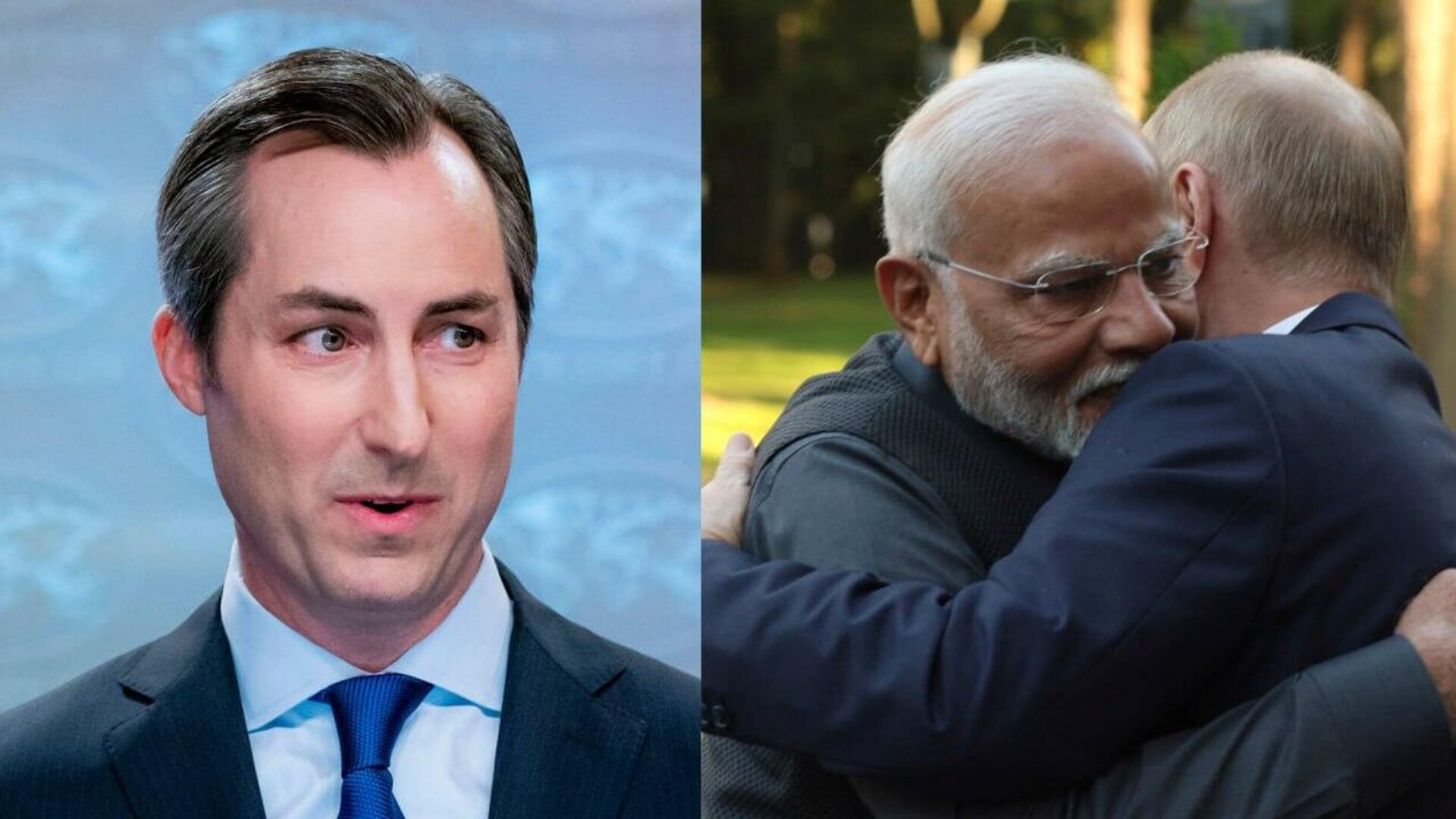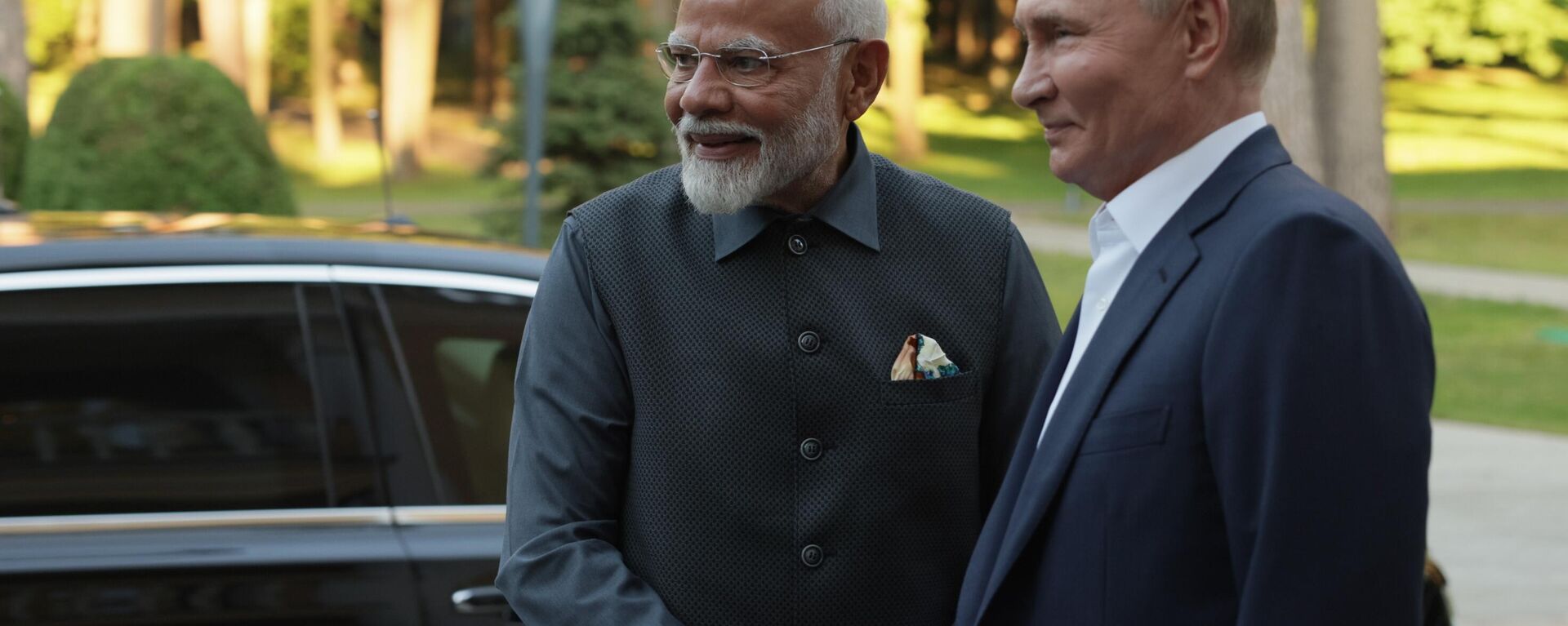https://sputniknews.in/20240712/us-ambassadors-comments-on-indian-autonomy-echo-deep-state-policy-7837436.html
US Ambassador's Comments on Indian Autonomy Echo Deep State Policy
US Ambassador's Comments on Indian Autonomy Echo Deep State Policy
Sputnik India
The US has shown unease over Indian Prime Minister Narendra Modi's deepening engagements and visits to Moscow, seeing potential challenges to its sanctions and trade policies, according to experts.
2024-07-12T21:08+0530
2024-07-12T21:08+0530
2024-07-12T21:14+0530
narendra modi
eric garcetti
vladimir putin
india
us
russia
the united nations (un)
brics
government of india
ministry of external affairs (mea)
https://cdn1.img.sputniknews.in/img/07e8/07/09/7805140_0:0:1280:720_1920x0_80_0_0_a4f219645625000e06c45b54c30b4dd7.jpg
The US ambassador to New Delhi's attack on India's sovereignty are a direct warning from the White House, pundits say.Strategic autonomy becomes irrelevant in times of conflict, and urging India to prioritize upholding principles in response to nations that challenge the rules-based international order or violate sovereign borders, said US Envoy Eric Garcetti on Thursday criticized Indian Prime Minister Narendra Modi's visit to Russia.Speaking at the Defence News Conclave, organised by the United Service Institute of India, the US Ambassador said: "I know and I respect that India likes its strategic autonomy. But in times of conflict, there is no such thing as strategic autonomy."Garcetti's comments indicate that the US exhibits noticeable unease over India Prime Minister Modi's deepening engagements and visits to Moscow, perceiving potential challenges to its sanctions and trade policies, Dr. Ash Narain Roy, Director of the Institute of Social Science (ISS), told Sputnik India.Roy highlighted that the sanctions imposed by Americans or Western powers lack the universal legitimacy attributed to UN sanctions. The restrictive meausures are focused on imposing specific trade restrictions, particularly with countries such as Iran and Russia, a practice he finds "unacceptable".However, Western interpretation of global rules or global order is being rejected by BRICS and similar groupings of developing countries, Roy said.US Envoy Remarks in India: A Modern Reflection of Historical CautionStrategic affairs expert Lieutenant Colonel J.S. Sodhi pointed out decades ago US presidential advisor and diplomat Henry Kissinger remarked that "to be an enemy of America can be dangerous, but to be a friend is fatal." That observation remains relevant today, he stated during a conversation with Sputnik India, and the statement of Garcetti is one clear evidence of it.Garcetti's criticism of Modi's positive relationship with President Putin shed that "America's stance has remained consistent over the years", the pundit said, echoing Kissinger's cautionary words about the risks of being an ally to the United States.Roy contended that the West's involvements, spanning from the Gulf War to operations in Iraq, Syria, and Africa, undermine its credibility to lecture on strategic autonomy.Since declaring independence on July 4, 1776, US, propelled by economic interests, has participated in around 200 wars and conflicts to advance its arms industry and economic objectives, Sodhi asserted.Independent India Rejects U.S. Attempts to Dictate Foreign PolicySodhi emphasised that a significant majority of the world's largest arms manufacturers, six out of ten, are based in the US, prompting its frequent involvement in international conflicts to stimulate its defence sector's growth."India asserts independence by firmly rejecting U.S. attempts to dictate its foreign policy, emphasizing impartiality in international relations," he highlighted.The US frequently highlights ongoing concerns regarding issues like the alleged targeting of Khalistani separatists in the US and Canada, which could potentially complicate India-US strategic closeness, Roy noted.Roy said that while India aims to procure advanced defence and other technologies, including from the US, this situation could also delay or prevent India's expected acquisition of cutting-edge technologies, particularly in defence.India perceives these challenges as threats to its sovereignty and strategic interests, which may hinder further development of Indo-US relations from India's perspective, Roy urged.
https://sputniknews.in/20240709/us-irked-at-modi-putin-meeting-as-india-russia-move-to-strengthen-ties-7801926.html
india
us
russia
Sputnik India
feedback.hindi@sputniknews.com
+74956456601
MIA „Rossiya Segodnya“
2024
Swapna Nair
https://cdn1.img.sputniknews.in/img/07e7/09/12/4320104_0:0:681:681_100x100_80_0_0_ca8a7d4d582609272840ffdd1cde7278.jpg
Swapna Nair
https://cdn1.img.sputniknews.in/img/07e7/09/12/4320104_0:0:681:681_100x100_80_0_0_ca8a7d4d582609272840ffdd1cde7278.jpg
News
en_IN
Sputnik India
feedback.hindi@sputniknews.com
+74956456601
MIA „Rossiya Segodnya“
Sputnik India
feedback.hindi@sputniknews.com
+74956456601
MIA „Rossiya Segodnya“
Swapna Nair
https://cdn1.img.sputniknews.in/img/07e7/09/12/4320104_0:0:681:681_100x100_80_0_0_ca8a7d4d582609272840ffdd1cde7278.jpg
strategic autonomy, india, nations, sovereign borders, us ambassador eric garcetti, indian prime minister narendra modi's, russia, defence news conclave, united service institute of india, strategic autonomy, india prime minister modi's, moscow, sanctions and trade policies, dr ash narain roy, director of institute of social science (iss), americans or western powers, un sanctions, western sanctions, trade restrictions, iran, russia, brics, developing countries, western interpretatio, global rules or global order, government's policy and attitude, american administration, lt col js sodhi, strategic affairs expert, henry kissinger, american diplomat, america, india, prime minister modi's visit to russia,president putin, united states, india-pakistan conflict, us 7th fleet, india, bay of bengal, americans, soviet ambassador to pakistan aleksei alekseyeyevich rodionov, pakistan, russia, reliable ally, west's involvements, gulf war, iraq, syria, africa, strategic autonomy, world's largest arms, us, defence sector's growth, india, security and interests autonomously, anti-indian activities, khalistani terrorists, india-us strategic, cutting-edge technologies, indo-us relations
strategic autonomy, india, nations, sovereign borders, us ambassador eric garcetti, indian prime minister narendra modi's, russia, defence news conclave, united service institute of india, strategic autonomy, india prime minister modi's, moscow, sanctions and trade policies, dr ash narain roy, director of institute of social science (iss), americans or western powers, un sanctions, western sanctions, trade restrictions, iran, russia, brics, developing countries, western interpretatio, global rules or global order, government's policy and attitude, american administration, lt col js sodhi, strategic affairs expert, henry kissinger, american diplomat, america, india, prime minister modi's visit to russia,president putin, united states, india-pakistan conflict, us 7th fleet, india, bay of bengal, americans, soviet ambassador to pakistan aleksei alekseyeyevich rodionov, pakistan, russia, reliable ally, west's involvements, gulf war, iraq, syria, africa, strategic autonomy, world's largest arms, us, defence sector's growth, india, security and interests autonomously, anti-indian activities, khalistani terrorists, india-us strategic, cutting-edge technologies, indo-us relations
The US ambassador to New Delhi's attack on India's sovereignty are a direct warning from the White House, pundits say.
Strategic autonomy becomes irrelevant in times of conflict, and urging India to prioritize upholding principles in response to nations that challenge the rules-based international order or violate sovereign borders, said US Envoy Eric Garcetti on Thursday criticized Indian Prime Minister Narendra Modi's visit to Russia.
Speaking at the Defence News Conclave, organised by the United Service Institute of India, the US Ambassador said: "I know and I respect that India likes its strategic autonomy. But in times of conflict, there is no such thing as strategic autonomy."
Garcetti's comments indicate that the US exhibits noticeable unease over India Prime Minister Modi's deepening engagements and visits to Moscow, perceiving potential challenges to its sanctions and trade policies, Dr. Ash Narain Roy, Director of the Institute of Social Science (ISS), told Sputnik India.
Roy highlighted that the sanctions imposed by Americans or Western powers lack the universal legitimacy attributed to UN sanctions. The restrictive meausures are focused on imposing specific trade restrictions, particularly with countries such as Iran and Russia, a practice he finds "unacceptable".
However, Western interpretation of global rules or global order is being rejected by BRICS and similar groupings of developing countries, Roy said.
US Envoy Remarks in India: A Modern Reflection of Historical Caution
Strategic affairs expert Lieutenant Colonel J.S. Sodhi pointed out decades ago US presidential advisor and diplomat Henry Kissinger remarked that "to be an enemy of America can be dangerous, but to be a friend is fatal." That observation remains relevant today, he stated during a conversation with Sputnik India, and the statement of Garcetti is one clear evidence of it.
"[The] US ambassador's speech mirrors the government's policy and attitude, making it evident that his remarks in India reflect the current thoughts and considerations of the American administration," Sodhi stressed.
Garcetti's criticism of Modi's
positive relationship with President Putin shed that "America's stance has remained consistent over the years", the pundit said, echoing Kissinger's cautionary words about the risks of being an ally to the United States.
Roy contended that the West's involvements, spanning from the Gulf War to operations in Iraq, Syria, and Africa, undermine its credibility to lecture on strategic autonomy.
Since declaring independence on July 4, 1776, US, propelled by economic interests, has participated in around 200 wars and conflicts to advance its arms industry and economic objectives, Sodhi asserted.
Independent India Rejects U.S. Attempts to Dictate Foreign Policy
Sodhi emphasised that a significant majority of the world's largest arms manufacturers, six out of ten, are based in the US, prompting its frequent involvement in
international conflicts to stimulate its defence sector's growth.
"India asserts independence by firmly rejecting U.S. attempts to dictate its foreign policy, emphasizing impartiality in international relations," he highlighted.
India affirms its right to determine its national security and interests autonomously, yet faces a paradox with the US and Western nations, who claim friendship while permitting anti-Indian activities, including from Khalistani terrorists or other extremists to thrive on their soil unchecked, the military pundit added.
The US frequently highlights ongoing concerns regarding issues like the alleged targeting of Khalistani separatists in the US and Canada, which could potentially complicate India-US strategic closeness, Roy noted.
Roy said that while India aims to procure advanced defence and other technologies, including from the US, this situation could also delay or prevent India's expected acquisition of cutting-edge technologies, particularly in defence.
India perceives these challenges as threats to its sovereignty and strategic interests, which may hinder further development of
Indo-US relations from India's perspective, Roy urged.



